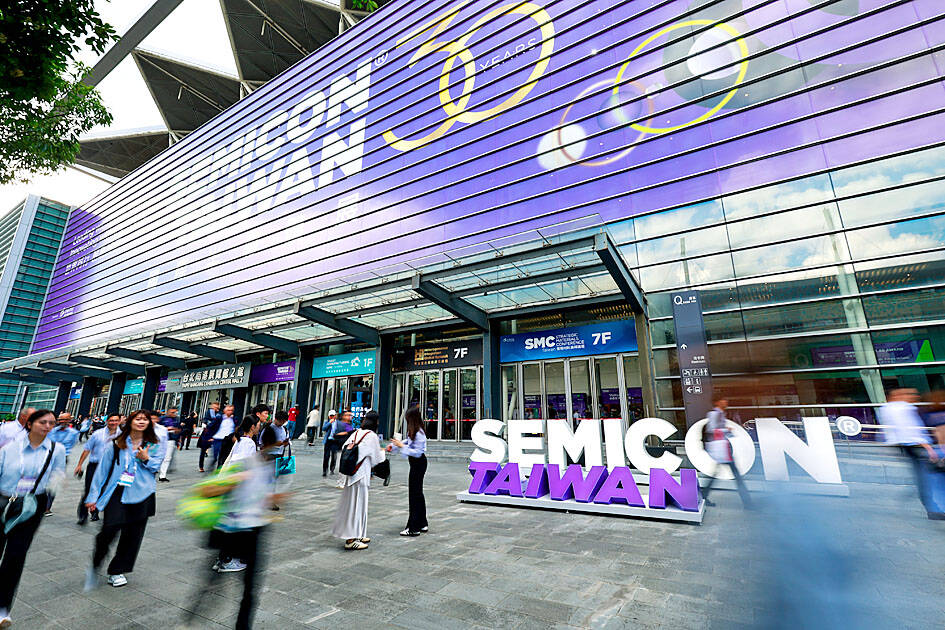As leading global semiconductor companies gathered in Taipei this week for the Semicon Taiwan trade show to discuss the artificial intelligence (AI) boom, one area got a much more prominent role than before: Taiwan’s use of its dominance of the chip industry to promote its diplomatic aims.
Taiwan, home to the world’s largest contract chipmaker, Taiwan Semiconductor Manufacturing Co (TSMC, 台積電), has long been the global industry leader, but it is diplomatically isolated owing to China’s sovereignty claims that prevent most nations forging formal diplomatic ties with Taipei.
Speaking at a side event on geopolitics that the Ministry of Foreign Affairs cosponsored for the first time at Semicon, Minister of Foreign Affairs Lin Chia-lung (林佳龍) said semiconductors and AI are “strategic resources.”

Photo: Ritchie B. Tongo, EPA
“We firmly believe that only by working with Taiwan can the free world create trusted non-red supply chains,” Lin said, referring to efforts to shift supply chains away from China.
Taiwan has been particularly keen to forge closer technology ties with other “like-minded” democracies, especially in central and eastern Europe where the Russian invasion of Ukraine has drawn sympathy for the threat Taiwan says it faces from China.
At a separate Semicon event attended by President William Lai (賴清德), Czech Minister for Science, Research and Innovation Marek Zenisek said his nation and Taiwan share the same values of democracy, freedom and openness.
“These values are under increasing pressure across the board. They are also the reason why our partnership is natural,” said Zenisek, whose nation is pitching itself as an ideal supplier for TSMC’s first European factory being built across the border in Germany’s Dresden.
Beyond Taiwan’s traditional, though informal supporters in the US and Europe, Semicon also drew some more unlikely attendees from nations that have long since ditched Taiwan to draw closer to China.
Of the 17 country pavilions at Semicon, the most ever, Costa Rica attended for the first time.
In 2007, it became the first nation in Central America to switch diplomatic ties from Taiwan to China.
Its delegation declined to comment when approached by Reuters.
There was also, for the first time, a delegation from Africa, a continent where China has broad diplomatic and economic influence, and Taiwan very little.
The group of 10 African technology entrepreneurs from the French-African Foundation met with Lin on a trip the French representative office helped arrange.
Joelle Itoua Owona, chief executive officer of AfriWell Health, a medical technology start-up active in the Republic of the Congo, which has not had relations with Taiwan since 1964, said that African governments want to diversify their partnerships.
Other countries such as the US and France get investment from both Taiwan and China, and Africa should be no different, she said.
“Taiwan is an additional friend” for Africa, Owona said.

The Grand Hotel Taipei on Saturday confirmed that its information system had been illegally accessed and expressed its deepest apologies for the concern it has caused its customers, adding that the issue is being investigated by the Ministry of Justice Investigation Bureau. The hotel said that on Tuesday last week, it had discovered an external illegal intrusion into its information system. An initial digital forensic investigation confirmed that parts of the system had been accessed, it said, adding that the possibility that some customer data were stolen and leaked could not be ruled out. The actual scope and content of the affected data

DO THEY BITE IT? Cats have better memories than people might think, but their motivation is based entirely around the chance of getting fed Cats can remember the identity of the people who fed them the day before, Taipei-based veterinarians said on Friday, debunking a popular myth that cats have a short memory. If a stray does not recognize the person who fed them the previous day, it is likely because they are not carrying food and the cat has no reason to recognize them, said Wu Chou Animal Hospital head Chen Chen-huan (陳震寰). “When cats come to a human bearing food, it is coming for the food, not the person,” he said. “The food is the key.” Since the cat’s attention is on the food, it

‘LIKE-MINDED PARTNER’: Tako van Popta said it would be inappropriate to delay signing the deal with Taiwan because of China, adding he would promote the issue Canadian senators have stressed Taiwan’s importance for international trade and expressed enthusiasm for ensuring the Taiwan-Canada trade cooperation framework agreement is implemented this year. Representative to Canada Harry Tseng (曾厚仁) in an interview with the Central News Agency (CNA) said he was increasingly uneasy about Ottawa’s delays in signing the agreement, especially as Ottawa has warmed toward Beijing. There are “no negotiations left. Not only [is it] initialed, we have three versions of the text ready: English, French and Mandarin,” Tseng said. “That tells you how close we are to the final signature.” Tseng said that he hoped Canadian Prime Minister Mark Carney

President William Lai (賴清德) yesterday bestowed one of Taiwan’s highest honors on Saint Vincent and the Grenadines (SVG) Ambassador Andrea Clare Bowman in recognition of her contributions to bilateral ties. “By conferring the Order of Brilliant Star with Grand Cordon on Ambassador Bowman today, I want to sincerely thank her, on behalf of the Taiwanese people, for her outstanding contribution to deepening diplomatic ties between Taiwan and SVG,” Lai said at a ceremony held at the Presidential Office in Taipei. He noted that Bowman became SVG’s first ambassador to Taiwan in 2019 and